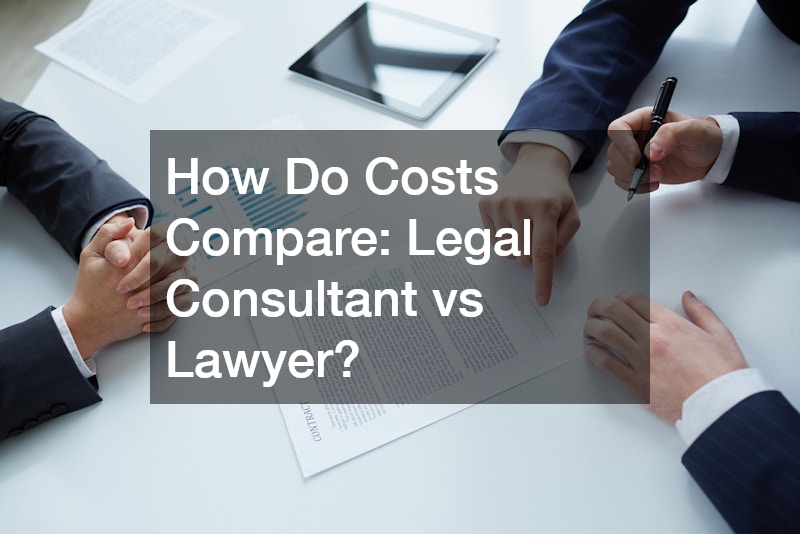Understanding the roles and differences between a legal consultant and a lawyer is crucial when seeking legal assistance. Many people begin their search for legal help without knowing which professional is right for them, and this can create confusion, wasted time, and even additional expenses. While both consultants and lawyers are knowledgeable about the law, their responsibilities, qualifications, and limitations are very different.
For individuals, this distinction can determine whether they receive the right kind of support during life-changing events such as a divorce, an injury claim, or a social security disability application. For businesses, knowing when to hire a consultant versus a lawyer can save significant costs while ensuring compliance with regulatory requirements. Whether you are working with divorce lawyers, accident attorneys, bankruptcy law firms, or social security disability attorneys, the key is to understand how these roles intersect and when they diverge.
This guide will help you navigate through the complexities of hiring the right professional for your needs, offering clear explanations and practical insights so you can make confident, informed decisions.
What Are the Key Differences Between a Legal Consultant and a Lawyer?
Definition and Role of a Legal Consultant
A legal consultant primarily provides advice, strategic guidance, and analysis. They do not represent clients in court but instead focus on developing policies, interpreting regulations, and helping individuals or corporations plan their legal strategies. For instance, a company may hire a consultant to analyze employment law compliance or assist with internal policy development.
Definition and Role of a Lawyer
A lawyer, on the other hand, is licensed to practice law and represent clients in legal proceedings. Whether you need a personal injury attorney to negotiate a settlement, a workers comp lawyer to handle a workplace claim, or a criminal attorney to defend you in court, lawyers have the authority to argue cases before a judge and provide full-service representation.
Education and Qualifications
Lawyers must complete law school, pass the bar exam, and maintain state licensing requirements. Legal consultants often also have legal backgrounds, sometimes with advanced degrees or specialized certifications, but they may not be licensed to practice law in the traditional sense.
Range of Services Offered
Legal consultants specialize in advisory services and research-driven solutions. Lawyers handle everything from drafting contracts and filing lawsuits to offering legal representation for disability cases or representing clients during divorce proceedings.
Licensing Requirements
Licensing is the dividing line. A consultant may have deep expertise, but without a license, they cannot represent clients in litigation or officially act as legal counsel. A licensed lawyer, however, can file lawsuits, appear in court, and defend your rights.
When Should You Hire a Legal Consultant?

Project-Based Legal Needs
Legal consultants are ideal for project-based work, such as advising on corporate restructuring or creating internal compliance guidelines. Their focused expertise can add value without the need for long-term legal representation.
Efficiency in Legal Strategy
For businesses seeking efficiency, consultants can streamline legal strategies by providing clear pathways for compliance and reducing risks. Their role is advisory rather than combative, which often works well for strategic planning.
Policy Development and Advisory Services
Consultants often help draft or review company policies to ensure compliance with local, state, or federal regulations. An immigration firm, for example, may collaborate with consultants to develop employment policies for businesses hiring international workers.
Cost-Effective Solutions for Corporations
Large corporations frequently rely on consultants to provide specialized knowledge without the ongoing expense of hiring multiple lawyers. Consultants can identify risks and recommend solutions at a fraction of the cost of continuous legal representation.
Simplifying Complex Legal Issues
Consultants excel at breaking down complicated issues into understandable solutions. This is especially valuable for organizations managing cross-border legal matters or regulatory frameworks.
When Is It Best to Hire a Lawyer?
Legal Representation in Court
Whenever court appearances are necessary, only a lawyer can provide legal representation. This includes criminal defense, civil lawsuits, and appeals. A criminal attorney, for example, can stand before a judge on your behalf, something a consultant cannot do.
Handling Complex Legal Disputes
Disputes involving contracts, financial liabilities, or negligence claims often require skilled lawyers. Accident attorneys and personal injury attorneys are indispensable when pursuing compensation after car crashes, workplace accidents, or medical malpractice.
In addition to resolving disputes, lawyers provide peace of mind by guiding clients through high-stakes moments that consultants cannot handle alone. For example, divorce lawyers not only negotiate settlements but also protect parental rights and financial assets during emotionally charged proceedings. Bankruptcy law firms go beyond paperwork by representing clients in hearings and defending them against creditor challenges. Similarly, social security disability attorneys don’t just help file applications; they also appeal denials and argue cases before administrative judges. These responsibilities highlight why lawyers remain indispensable whenever the outcome of a case directly impacts a client’s livelihood or future.
Protection of Client Rights
Lawyers safeguard your rights under the law. For instance, social security disability attorneys protect clients applying for benefits, ensuring their rights are respected and their applications are properly handled.
Drafting and Reviewing Contracts
Contracts carry legal weight, and lawyers are best equipped to draft and review them to protect your interests. Whether you are going through a divorce or managing a business partnership, divorce lawyers or business attorneys ensure documents are legally enforceable.
Navigating Regulatory Compliance
Lawyers help navigate complex regulatory systems, including bankruptcy law firms that assist individuals or businesses in managing overwhelming debt while complying with federal bankruptcy regulations.
How Do Costs Compare: Legal Consultant vs Lawyer?

Understanding Billing Structures
Consultants often bill per project or on a flat-fee basis, while lawyers typically charge hourly rates. Understanding these billing structures can help clients choose the most cost-effective path.
Project vs Hourly Rates
Consultants may be more affordable for one-time projects, whereas lawyers’ hourly rates can add up quickly in ongoing litigation or negotiations. For example, a workers comp lawyer handling a lengthy claim might cost more overall compared to a consultant hired for compliance training.
Cost Considerations for Startups
Startups often benefit from hiring consultants early on to establish legal frameworks, saving money before ongoing representation becomes necessary. Once disputes arise, though, a lawyer becomes essential.
Value-Driven Billing Models
Some lawyers, particularly personal injury attorneys and accident attorneys, work on contingency fees. This means they only get paid if they win your case, offering tremendous value for clients unable to pay upfront.
Getting the Best Return on Investment
Choosing between consultants and lawyers often comes down to ROI. For strategic guidance, consultants may be the better choice. For disputes, representation, or defense, lawyers deliver the most tangible value.
What Credentials Should You Look for in Legal Professionals?
Certifications and Accreditations
Both consultants and lawyers should have relevant certifications. For lawyers, this includes passing the bar; for consultants, it may include advanced degrees or certifications in specialized fields.
Areas of Specialization
Look for professionals with expertise in your area of need. Divorce lawyers, immigration firms, and bankruptcy law firms all specialize in very different aspects of law. Choosing the right specialist ensures better outcomes.
Attorneys also play a critical role in estate planning, which is another area where specialization matters. A lawyer who focuses on wills and trusts can draft documents such as a living trust to help clients protect assets, avoid probate, and ensure their wishes are carried out. While a consultant may offer strategic advice about estate planning options, only a licensed lawyer can prepare binding legal documents that hold up in court. For families and individuals concerned about passing wealth to future generations, finding a professional experienced in creating a living trust can make all the difference.
Reputation and Client Reviews
Client reviews and testimonials reveal how effectively a lawyer or consultant has helped others in similar situations. This is often the best way to gauge reliability and trustworthiness.
Professional Associations
Membership in associations signals credibility. For example, social security disability attorneys may be members of organizations advocating for disability rights.
Continuous Legal Education
Because laws evolve, professionals who pursue continuing education demonstrate a commitment to staying current, which benefits their clients.
Can a Legal Consultant Act as a Lawyer?

Scope of Practice Limitations
Consultants cannot practice law without a license. They can advise, but they cannot represent clients in disputes or court.
Understanding Legal Advice vs Legal Action
Consultants provide legal advice, but only lawyers can take legal action. This distinction is critical in high-stakes situations.
Jurisdictional Restrictions
Even if a consultant has strong knowledge, they may face restrictions on what they can legally provide depending on the jurisdiction.
Consultant’s Role in Legal Teams
Consultants often collaborate with lawyers by handling background research, compliance strategies, or drafting materials. For example, an immigration firm may employ both consultants and lawyers for a well-rounded approach.
Benefits of a Collaborative Approach
A collaborative legal team that includes both lawyers and consultants can offer strategic, cost-effective, and comprehensive legal solutions.
How Do You Choose Between a Legal Consultant and a Lawyer?
Assessing Your Specific Needs
If you need courtroom representation, you must hire a lawyer. If your needs are advisory, a consultant might be enough.
Evaluating Experience and Expertise
Examine whether their expertise matches your situation, whether that’s a workers comp lawyer handling injury claims or a consultant developing HR compliance policies.
Matching Service Offerings to Requirements
Select the professional whose services align directly with your goals. Complex disputes call for lawyers, while strategic planning may lean toward consultants.
Budget Constraints and Financial Planning
Budget plays a key role. Consultants may be more affordable for corporations, while lawyers are indispensable for disputes despite their higher fees.
Consultation and Advisory Sessions
Scheduling initial consultations helps determine who fits best with your needs and comfort level.
What Are the Pros and Cons of Hiring a Legal Consultant?

Flexibility and Customization of Services
Consultants offer flexibility by tailoring services to specific projects or short-term needs.
Potential Cost Savings
They often charge less than lawyers, making them more affordable for corporations or individuals not facing litigation.
Specialized Knowledge and Access
Consultants may provide highly specialized expertise, such as international policy or niche compliance.
Limitations in Legal Representation
Their biggest drawback is their inability to represent clients in disputes or litigation.
Reliability and Accountability Factors
Because consultants are not licensed attorneys, accountability may be less enforceable compared to regulated lawyers.
What Are the Risks of Not Hiring a Lawyer When Needed?
Legal Missteps and Consequences
Without a lawyer, you risk making costly mistakes that can negatively affect your case.
Challenges in Self-Representation
Representing yourself is rarely advisable, especially in criminal cases where a criminal attorney could mean the difference between freedom and conviction.
Lack of Legal Protection and Defense
Without legal representation for disability claims or other cases, individuals may miss out on vital protections and benefits.
Navigational Risks in Complex Lawsuits
Court procedures and regulations are highly complex. Accident attorneys and personal injury attorneys are trained to navigate these systems effectively.
Potential Financial and Legal Damage
Failing to hire a lawyer when necessary can lead to significant financial losses and long-term legal consequences.
How Can Legal Technology Improve Your Experience?
The Role of Technology in Legal Advice
Technology has changed how consultants and lawyers deliver advice. Online platforms allow quicker access to legal resources.
Enhancing Efficiency with Legal Software
Case management systems reduce paperwork and streamline processes, saving time and money.
Communication and Case Management Tools
Both consultants and lawyers use digital tools to keep clients updated and cases organized.
Innovations in Legal Research and Analysis
Advanced research platforms make it easier to analyze precedents and strengthen legal strategies.
Digital Solutions for Legal Consultants and Lawyers
Virtual consultations, e-filing systems, and digital case tracking improve client access and overall efficiency.
Deciding between a legal consultant and a lawyer hinges on understanding your specific needs and the scope of your legal challenges. If you require courtroom representation, negotiation with opposing counsel, or defense of your rights, a lawyer is the only choice. If you need strategic advice, policy development, or compliance guidance, a consultant may provide excellent value.
From divorce lawyers guiding clients through family disputes to immigration firms supporting businesses and individuals, from bankruptcy law firms managing financial crises to social security disability attorneys advocating for benefits, each area of law requires careful selection of professionals. Accident attorneys, workers comp lawyers, and personal injury attorneys bring specialized skills to fight for fair compensation, while consultants may support behind the scenes with strategy and compliance.
Ultimately, the decision between a legal consultant vs lawyer comes down to aligning professional expertise with your goals. By understanding their roles, weighing costs, and evaluating credentials, you can secure the legal help best suited to your situation while protecting both your rights and your future.



